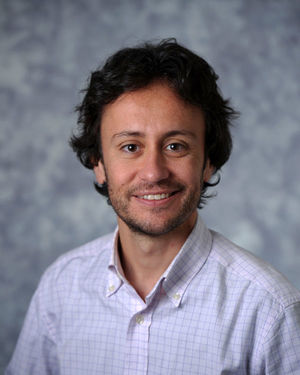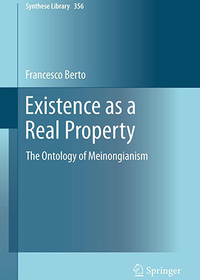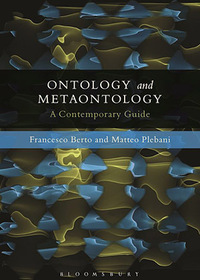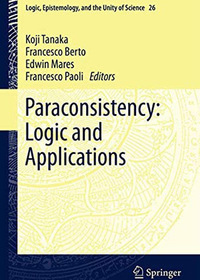
- University of Amsterdam
- Professor of Philosophy and Structural Chair of Logic and Metaphysics
- Affiliation During NDIAS Fellowship: University of Aberdeen
- Residential Fellow (2010-2011)
- “The Metaphysical Foundations of Logic: The Law of Non-Contradiction As Basic Knowledge”
Francesco Berto is Structural Chair of Logic and Metaphysics at the Institute for Logic, Language and Computation (ILLC) and at the Department of Philosophy, University of Amsterdam. Before landing in Amsterdam, he worked at the University of Aberdeen in the UK, at the Sorbonne-Ecole Normale Supérieure in Paris, and at the Universities of Venice, Padua, and Milan-San Raffaele in Italy.
He specializes in ontology and metaphysics, including Meinongian ontology, ontological commitment, and modal metaphysics; philosophy of logic, epistemic and non-classical logics; continental philosophy, including Hegel’s dialectics; and philosophy of language.
Professor Berto's publications in English include the books Ontology and Metaontology (2015, with Matteo Plebani), Existence as a Real Property (2012), There's Something About Gödel (2009), and How to Sell a Contradiction (2007). He has also published in a number of distinguished journals, ranging from the Review of Symbolic Logic to The Philosophical Quarterly, Mind, Synthese, Erkenntnis, Philosophical Studies, Journal of Philosophical Logic, Australasian Journal of Philosophy, European Journal of Philosophy, Philosophia Mathematica, and Dialectica. He handles three entries of the Stanford Encyclopedia of Philosophy. He is currently working with Mark Jago from the University of Nottingham on a book, Impossible Worlds, for Oxford University Press.
Publications
-
Existence as a Real Property: The Ontology of Meinongianism
Springer, 2013

This profound exploration of one of the core notions of philosophy—the concept of existence itself—reviews, then counters (via Meinongian theory), the mainstream philosophical view running from Hume to Frege, Russell, and Quine, summarized thus by Kant: “Existence is not a predicate.” The initial section of the book presents a comprehensive introduction to, and critical evaluation of, this mainstream view. The author moves on to provide the first systematic survey of all the main Meinongian theories of existence, which, by contrast, reckon existence to be a real, full-fledged property of objects that some things possess, and others lack. As an influential addition to the research literature, the third part develops the most up-to-date neo-Meinongian theory called Modal Meinongianism, applies it to specific fields such as the ontology of fictional objects, and discusses its open problems, laying the groundwork for further research.
In accordance with the latest trends in analytic ontology, the author prioritizes a meta-ontological viewpoint, adopting a dual definition of meta-ontology as the discourse on the meaning of being, and as the discourse on the tools and methods of ontological enquiry. This allows a balanced assessment of philosophical views on a cost-benefit basis, following multiple criteria for theory evaluation. Compelling and revealing, this new publication is a vital addition to contemporary philosophical ontology.
-
Ontology and Metaontology: A Contemporary Guide
Bloomsbury, 2015

Ontology and Metaontology: A Contemporary Guide is a clear and accessible survey of ontology, focusing on the most recent trends in the discipline.
Divided into parts, the first half characterizes metaontology: the discourse on the methodology of ontological inquiry, covering the main concepts, tools, and methods of the discipline, exploring the notions of being and existence, ontological commitment, paraphrase strategies, fictionalist strategies, and other metaontological questions. The second half considers a series of case studies, introducing and familiarizing the reader with concrete examples of the latest research in the field. The basic sub-fields of ontology are covered here via an accessible and captivating exposition: events, properties, universals, abstract objects, possible worlds, material beings, mereology, fictional objects.
The guide’s modular structure allows for a flexible approach to the subject, making it suitable for both undergraduates and postgraduates looking to better understand and apply the exciting developments and debates taking place in ontology today.
-
Paraconsistency: Logic and Applications
Springer, 2013

A logic is called ‘paraconsistent’ if it rejects the rule called ‘ex contradictione quodlibet’, according to which any conclusion follows from inconsistent premises. While logicians have proposed many technically developed paraconsistent logical systems and contemporary philosophers like Graham Priest have advanced the view that some contradictions can be true, and advocated a paraconsistent logic to deal with them, until recent times these systems have been little understood by philosophers. This book presents a comprehensive overview on paraconsistent logical systems to change this situation.
The book includes almost every major author currently working in the field. The papers are on the cutting edge of the literature some of which discuss current debates and others present important new ideas. The editors have avoided papers about technical details of paraconsistent logic, but instead concentrated upon works that discuss more “big picture” ideas. Different treatments of paradoxes takes centre stage in many of the papers, but also there are several papers on how to interpret paraconistent logic and some on how it can be applied to philosophy of mathematics, the philosophy of language, and metaphysics.